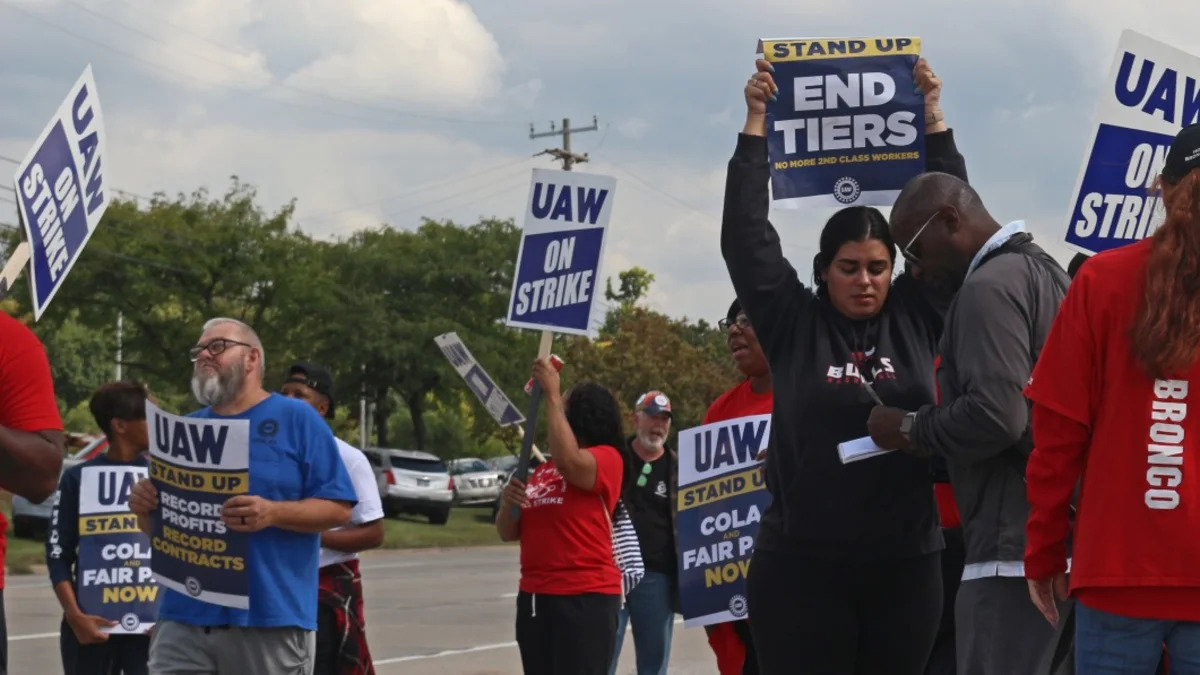DETROIT — The United Auto Workers said it has made significant progress toward a deal with Ford Motor ahead of its Friday deadline to reach new labor agreements before expanding its strike with the Detroit Three automakers.
UAW President Shawn Fain announced in a Facebook livestream that the union has reached agreements with Ford for concessions on cost-of-living adjustments (reinstated COLA formula that was suspended in 2009), enhanced profit sharing, right to strike over plant closures, two years of income security and healthcare for laid-off workers (applies to all employees with at least 90 days of employment), conversion of temporary workers and more.
“Ford is working diligently with the UAW to reach a deal that rewards our workforce and enables Ford to invest in a vibrant and growing future," the company said in a statement. "Although we are making progress in some areas, we still have significant gaps to close on the key economic issues. In the end, the issues are interconnected and must work within an overall agreement that supports our mutual success.”
Similar agreements were not made with either GM or Stellantis, and the lack of progress is resulting in additional facilities going on strike. Fain called upon all GM and Stellantis parts distribution facilities to strike beginning at noon Eastern. He announced strikes at 38 locations across 20 states. All of the plants already on strike will remain on strike, according to Fain.
"We’re expecting to stand-up strike in response to the lack of progress in bargaining with General Motors and Stellantis," Fain said. "We will shut down parts distribution until those two companies come to their senses and come to the table with a serious offer."
In addition to the new facilities on strike, Fain invited President Biden to join the UAW on the picket line.
“We invite and encourage everyone who supports our cause to join us on the picket line … all the way up to the president of the United States," Fain said.
But an ongoing strike won't just affect automakers. “Along with the specter of ongoing low inventory and some vehicles perhaps being in even shorter supply as a result, the situation also creates potential challenges for dealers and customers, if repair parts become difficult to source," said Stephanie Brinley, associate director, Automotive Intelligence, S&P Global Mobility. "But UAW leadership believes it has public support. In announcing this move, the UAW said automakers and dealers could ensure customers aren’t hurt, if they avoid ’price gouging.' It is unclear how much patience an average consumer will have if they cannot get a vehicle serviced.”
The UAW last week launched unprecedented, simultaneous strikes at one assembly plant each of General Motors, Ford and Chrysler parent Stellantis, but analysts expect any wider strike will include plants that build highly profitable pickup trucks, GM's Chevy Silverado and Stellantis' Ram.
About 12,700 workers walked out at plants in Missouri, Michigan and Ohio, which produce the Ford Bronco, Jeep Wrangler and Chevrolet Colorado, alongside other popular models. UAW President Shawn Fain has warned that more of the union's 146,000 members who work at the Detroit Three will join them if new deals are not reached before noon EDT (1600 GMT) on Friday.
The standoff is fueling worries about prolonged industrial action that could disrupt production and ripple through the supply chain and dent U.S. economic growth. A Reuters/Ipsos poll released on Thursday shows significant support by Americans for the striking auto workers.
Fain has said the Detroit automakers have not shared their huge profits with workers while enriching executives and investors.
GM President Mark Reuss this week rejected those claims, saying the current offer to the union would be generous and the company's profits have been reinvested in the transition to electric vehicles.
The automakers have proposed 20% raises over 4-1/2 years, while the UAW is seeking 40%.
The union also wants to end a tiered wage structure that it says has created a large gap between newer and older employees.
S&P said the strikes, which began on Sept. 15, were highly likely to last several weeks, potentially cutting third-quarter U.S. gross domestic product by 0.39% and causing "upheaval" across global automotive supply chains.
GM, Ford and Stellantis have said they are making contingency plans for further U.S. work stoppages.
Ford reached a last-minute deal to avoid a walkout at its Canadian operations late on Tuesday. Unifor, which represents about 5,600 Canadian auto workers, had been threatening to go on strike at all three Ford plants in the country.
Reuters contributed to this report.


Sign in to post
Please sign in to leave a comment.
Continue